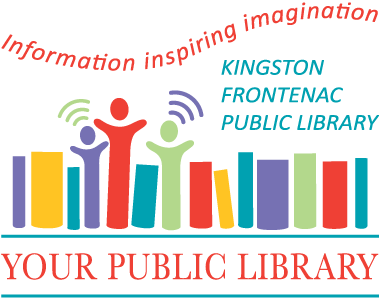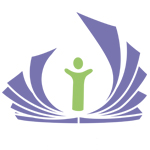Accessibility for Users with Disabilities
The Kingston Frontenac Public Library (the Library) is committed to meeting its current and ongoing obligations under the Ontario Human Rights Code respecting non-discrimination.
The Library understands that obligations under the Accessibility for Ontarians with Disabilities Act, 2005 (AODA) and its accessibility standards do not substitute or limit its obligations under the Ontario Human Rights Code or obligations to people with disabilities under any other law.
The Library is committed to complying with both the Ontario Human Rights Code and the AODA.
1. Purpose
The purpose of this policy is to ensure that the Kingston Frontenac Public Library (the Library) provides all library services, resources and facilities in ways that are accessible to persons with disabilities. The policy also serves to meet the requirements of the Accessibility for Ontarians with Disabilities Act (AODA).
2. Scope
This policy applies to all persons who deal with customers or patrons, and to third parties who deal with customers on the Library’s behalf such as those providing program services. A person or third party can be an employee, volunteer, Friend of the Library, KFPL Board member, student on placement or someone otherwise engaged in the provision of Library services to our customers.
3. Definitions
AODA means the Accessibility for Ontarians with Disabilities Act, 2005.
Assistive Device means a device used to assist persons with disabilities in carrying out activities or in accessing Library services. Assistive devices may include, but are not limited to, wheelchairs, walkers, canes, oxygen tanks, and electronic communication devices.
Core Service means reference, referral and readers’ services, collections, lending, technology, programming and outreach.
Disability or Disabilities means:
- any degree of physical disability, infirmity, malformation or disfigurement that is caused by bodily injury, birth defect or illness and, without limiting the generality of the foregoing, includes diabetes mellitus, epilepsy, a brain injury, any degree of paralysis, amputation, lack of physical co-ordination, blindness or visual impediment, deafness or hearing impediment, muteness or speech impediment, or physical reliance on a guide dog or other animal or on a wheelchair or other remedial appliance or device;
- a condition of mental impairment or a developmental disability;
- a learning disability, or a dysfunction in one or more of the processes involved in understanding or using symbols or spoken language;
- a mental disorder; or,
- an injury or disability for which benefits were claimed or received under the insurance plan established under the Workplace Safety and Insurance Act, 1997.
Guide dog means a guide dog as defined in section 1 of the Blind Persons’ Act.
Service Animal means:
An animal is a service animal for a person with a disability if,
- the animal can be readily identified as one that is being used by the person for reasons relating to the person’s disability, as a result of visual indicators such as the vest or harness worn by the animal; or
- the person provides documentation from one of the following regulated health professionals confirming that the person requires the animal for reasons relating to the disability:
- A member of the College of Audiologists and Speech-Language Pathologists of Ontario.
- A member of the College of Chiropractors of Ontario.
- A member of the College of Nurses of Ontario.
- A member of the College of Occupational Therapists of Ontario.
- A member of the College of Optometrists of Ontario.
- A member of the College of Physicians and Surgeons of Ontario.
- A member of the College of Physiotherapists of Ontario.
- A member of the College of Psychologists of Ontario.
- A member of the College of Registered Psychotherapists and Registered Mental Health Therapists of Ontario. O. Reg. 165/16, s. 16
Library Premises means premises owned and operated, or operated by the Kingston Frontenac Public Library.
Support Person means, in relation to a person with a disability, another person who accompanies a person with a disability in order to assist them with communication, mobility, personal care, or medical needs, or with access to goods, services or facilities.
4. Guiding Principles
Library service is relevant, inclusive and responsive for all, including persons with disabilities. Each member of the community has an equal opportunity to access public library goods, services or facilities.
Library services are provided in a manner that respects the dignity and independence of persons with disabilities. We believe in integration and we are committed to meeting the needs of people with disabilities in a timely manner.
Library services to persons with disabilities are integrated with those provided to persons who do not have disabilities, unless an alternative measure is necessary to enable a person with a disability to obtain, use or benefit from Library goods, services or facilities.
5. Policy
The Library is committed to providing quality library services that are accessible to all persons who wish to obtain and use Library goods, services or facilities.
5.1. Communications with Persons with Disabilities
When communicating with a person with a disability, the Library will do so in a manner that takes into account the person’s disability.
When asked, we will provide information about our organization and its services, including public safety information, in accessible formats or with communication supports.
We will also meet internationally-recognized Web Content Accessibility Guidelines (WCAG) 2.0 Level AA website requirements in accordance with Ontario’s accessibility laws.
Policy documents will be available on the Library website.
5.2. Temporary Service Disruptions
The Library will make reasonable effort to provide notice of any planned disruption of Library services to the public, including information about the reason for the disruption, its anticipated duration and a description of alternative facilities or service, if any, that may be available. If a disruption is unplanned, the Library will provide notice as soon as possible.
5.3. Assistive Devices and other measures that assist with Accessibility
A person with a disability may provide their own assistive device for the purpose of obtaining or using Library goods, services or facilities. Exceptions may occur in situations where the Library has determined that the assistive device may pose a risk to the health and safety of a person with a disability or the health and safety of others on the premises. In these situations the Library may offer a person with a disability other reasonable measures to assist them in obtaining and using Library goods, services or facilities, where the Library has such other measures available.
It is the responsibility of the person with a disability to ensure that their assistive device is operated in a safe and controlled manner at all times.
Further accessibility resources are addressed in the Collection Development Policy, under Accessible Collections.
5.4. Service Animals
A person with a disability may enter Library premises accompanied by a service animal, and may keep the animal with them if the public has access to such premises and the animal is not otherwise excluded by law. If the service animal is excluded by law, the Library will ensure that alternative means are available to enable the person with a disability to obtain or use or benefit from Library services or facilities.
At times it may be difficult to differentiate between a person with a disability using a service animal and an individual being accompanied by a pet. If it is not readily apparent that the animal is a service animal, Library staff may ask the person for confirmation of the animal’s status, as outlined above.
It is the responsibility of the person with the disability to ensure that their service animal is kept in control at all times. This will include controlling the behavior of the animal (e.g. barking or growling), cleaning up after the animal (e.g. defecation), and being responsible for any damage the animal may cause to the Library premises.
5.5. Support Persons
A person with a disability may enter Library premises with a support person, and have access to the support person at all times while on the premises.
The Library may require a person with a disability to be accompanied by a support person while on Library premises in situations where it is necessary to protect the health and safety of the person with the disability or the health and safety of others. Before making a decision to require a support person, the Library will consult with the person with a disability to understand their needs, consider health or safety reasons based on available evidence and determine if there is any other reasonable way to protect the health or safety of the person or others on the premises.
A support person, when assisting a person with a disability to obtain or use Library services, will be permitted to attend at no charge where an admission fee is applicable.
Where an admission fee is charged to gain access to an event, facility, or service, and the revenue from the fee is payable to a third party (e.g. a concert provider), the support person is permitted to attend the event at their own cost.
If a third party uses a Library meeting room to host an event, they are not required to alter their admission fees for support persons, but we would strongly encourage them to do so. However, if a third party voluntarily decides to alter admission fees for support persons for their event, the Library will not be responsible for reimbursing them for the value of those admission fees.
In response to a request for a sign language interpreter, the Library will endeavour to engage an interpreter through the Ontario Interpreting Services (OIS) at Canadian Hearing Services (CHS).
5.6. Training
The Library will ensure that all persons to whom this policy applies receive training as required by the Integrated Accessibility Standards (Ontario Regulation 191/11). The amount and format of training given will be dependent on a person’s interactions with Library users.
The content of the training will include:
- a review of the purposes of the AODA;
- the requirements of the Integrated Accessibility Standards (Ontario Regulation 191/11);
- training on the Human Rights Code as it pertains to persons with disabilities;
- instruction on Library policies, procedures and practices pertaining to the provision of Library services to persons with disabilities;
- how to interact and communicate with persons with various types of disabilities;
- what to do if a person with a particular type of disability is having difficulty accessing Library goods, services or facilities;
- how to interact with persons with disabilities who use assistive devices or who require the assistance of a support person, guide dog or service animal; and,
- information about the equipment or devices available on the Library premises that may help with the provision of Library goods, services or access to facilities to persons with disabilities.
A record of training provided under this policy will be kept by the Director, Human Resources. Training will be provided as part of orientation training for new employees or as required to those covered by this policy.
5.7. Feedback and Complaints About Services
Feedback and complaints from a member of the public about the delivery of goods and services (including facilities) to persons with disabilities may be given by telephone, in person, in writing, in electronic format, or through other methods. Complaints and feedback will be received and addressed in accordance with the Library’s complaints administration process.
5.8. Procurement
We will incorporate accessibility criteria and features when procuring or acquiring goods, services or facilities, including self-serve kiosks. If it is not possible and practical to do so, we will provide an explanation upon request.
5.9. Self-service kiosks
We will incorporate accessibility features/consider accessibility for people with disabilities when designing, procuring or acquiring self-service kiosks.
5.10. Employment
We will notify employees, potential hires and the public that accommodations can be made during recruitment and hiring.
We will notify staff that supports are available for those with disabilities. We will use our accommodation policy to develop individual accommodation plans for employees.
Where needed, we will also provide customized emergency information to help an employee with a disability during an emergency.
Our performance management, career development and redeployment processes will take into account the accessibility needs of all employees.
5.11. Design of Public Spaces
We will meet accessibility laws when building or making major changes to public spaces. Public spaces include:
Outdoor paths of travel, like sidewalks, ramps, stairs, curb ramps, rest areas and accessible pedestrian signals
Service-related elements like service counters, fixed queuing lines and waiting areas
6. Appendices
7. Authorities
O. Reg 191/11 s. 6(1) under Accessibility for Ontarians with Disabilities Act, 2005.
8. Document Control
Original policy date: 2009 October
Last Reviewed: 2025 June
Changes made: see report to Board dated June 25, 2025
Next Review: 2026 June





